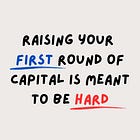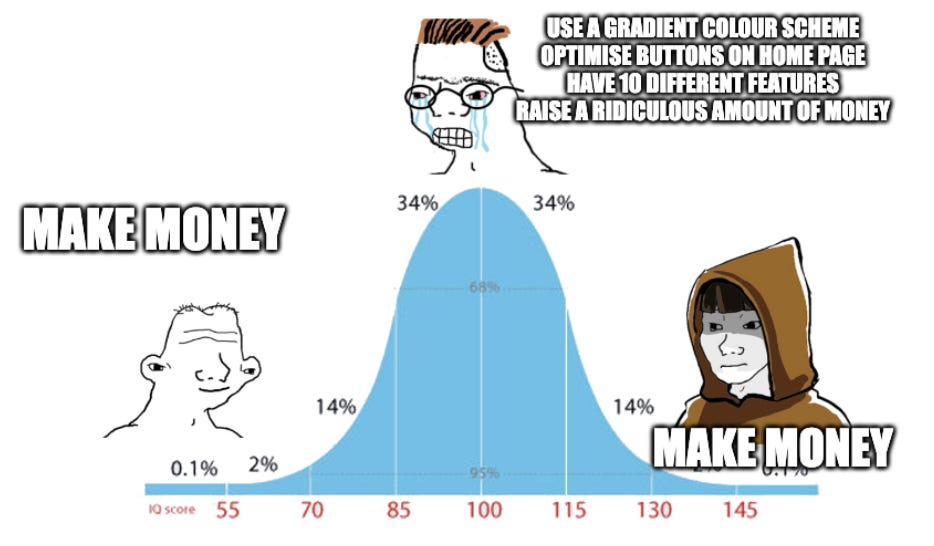Product Vision Doesn't Equal Commercial Sense
Building a great business requires both product vision and strong commercial sense
Welcome to all the new subscribers that have joined us over the last week! If you haven’t already, you should check out my last article here:
If you like what you read, please subscribe to Superfluid here:
Every VC fund's tagline has something about investing in people.
Sure, it sounds cliche, but it's actually true. At the early stage, you are in some cases quite literally investing in a person, or a team of people to go away and build a business.
At Rampersand, we call this looking for 'Abnormal Potential'.
As a result, a majority of my week is spent thinking about and critiquing people and their ability to execute. Every time I talk to a founder, my internal model of what 'abnormal potential' looks like updates.
Recently, I've been pondering the difference between 'Product Vision' and 'Commercial Sense'.
Product visionaries are undoubtedly put on a pedestal by VCs. Everyone loves to marvel at products that look and feel effortless. Product visionaries are seemingly capable of taking a person's problems and magically conjuring up solutions that delight.
It makes sense as to why this is the case. The core job-to-be-done of an early-stage startup is to solve at least one customer's problem incredibly well. Once you do that, theoretically, you'll be able to charge them a decent chunk of money in exchange for your product. From here, you acquire more customers and continue to solve their problems well. Do that enough times, and you might have a unicorn on your hands.
In every startup's journey, you go through a few phases. The first is doing the above in the simplest manner—one product and one feature that solves a customer's problem really well. From there, you start to add more features, and your product becomes bloated. It's hard to figure out what the product does well, and what features exist to augment the original use case.
There are a few reasons why this happens. In a positive light, existing customers want more of their problems solved, and so as a product-focused founder, you respond with different products that make sense to provide alongside your original product.
On the flip side, if no one wants to buy the product you originally built, the logical conclusion is that the product doesn't solve the customer's problem well enough. Hence, the easy solution is to go back into product development mode and keep building new features in the hope that this will lead to better customer acquisition.
While there isn't necessarily anything wrong with that thinking, a lot of founders get caught up in thinking their entire job is delivering great products. However, that's only the tip of the iceberg.
Any founder's job, whether they are venture-backed or not, is to build a business that can make a profit. That's just business fundamentals. To fully maximise the profit your business makes, usually, you need a great product. But, there are also numerous examples of businesses with pretty average products that are able to make enormous profits. Having a great product isn't the same as having a great business.
I think we're seeing this play out now with products using AI. We have a full cohort of AI-first products that have been able to grow pretty quickly by being first to market, have strong UI/UX functionality, and solve a customer's problem well, yet still have poor unit economics or face issues with churn.
The problem with AI startups is that it doesn't matter whether you're the infrastructure picks and shovels play, or a GPT-wrapper. The ability for incumbents to move quickly AND other well-funded startups (i.e., OpenAI) means that it's tough to counter-position with only a product. You need to think outside the box in everything you do.
Since the invention of the SaaS revenue model, we haven't necessarily seen that much business model innovation occur in tech. Maybe rightly so, given the huge benefit of having a recurring revenue stream. However, I think going forward, true startup disruption won't necessarily come from the product, but rather through playing around and subverting business models to drive different product incentives and outcomes for the end customer.
Again, using AI as an immediate example, we’re seeing startups charge their customers a standard subscription fee plus a transactional usage fee on top. The reason for this is purely to push the onus on customers to pay for their level of AI use. Instead, I think it creates an interesting disincentive to use such products heavily.
When you first start using a product, you’re unsure whether it will be worthwhile. You’re happy to pay for the first few months to see what happens, but if you don’t like the product, you’ll probably churn. With a standard SaaS revenue model, the customer has unbounded access to everything within a product (obviously contingent on pricing tiers).
However, startups that employ a SaaS plus usage model are essentially passing the AI bill shock onto their customers. When using a product structured this way, I feel reluctant to fully leverage the product's capabilities, hindering its integration into my workflows and daily life right from the start. This hesitation stems from not being able to experience the full potential of a product due to what seems like a flawed revenue model.
So, where am I going with this?
Back to my original point about the attributes I seek in the founders I back – I believe having both ‘Product Vision’ and ‘Commercial Sense’ is crucial. It's rare to find individuals who possess both these traits, and it's often easier when considering a team of two or more co-founders. However, in my experience, these qualities can't simply be hired for; they must be deeply embedded in an organization from the outset
I’d love to hear from people in the comments below about how you guys think about this (especially if you disagree!).
Make sure to subscribe now to not miss next week’s article
How did you like today’s article? Your feedback helps me make this amazing.
Thanks for reading and see you next time!
Abhi

